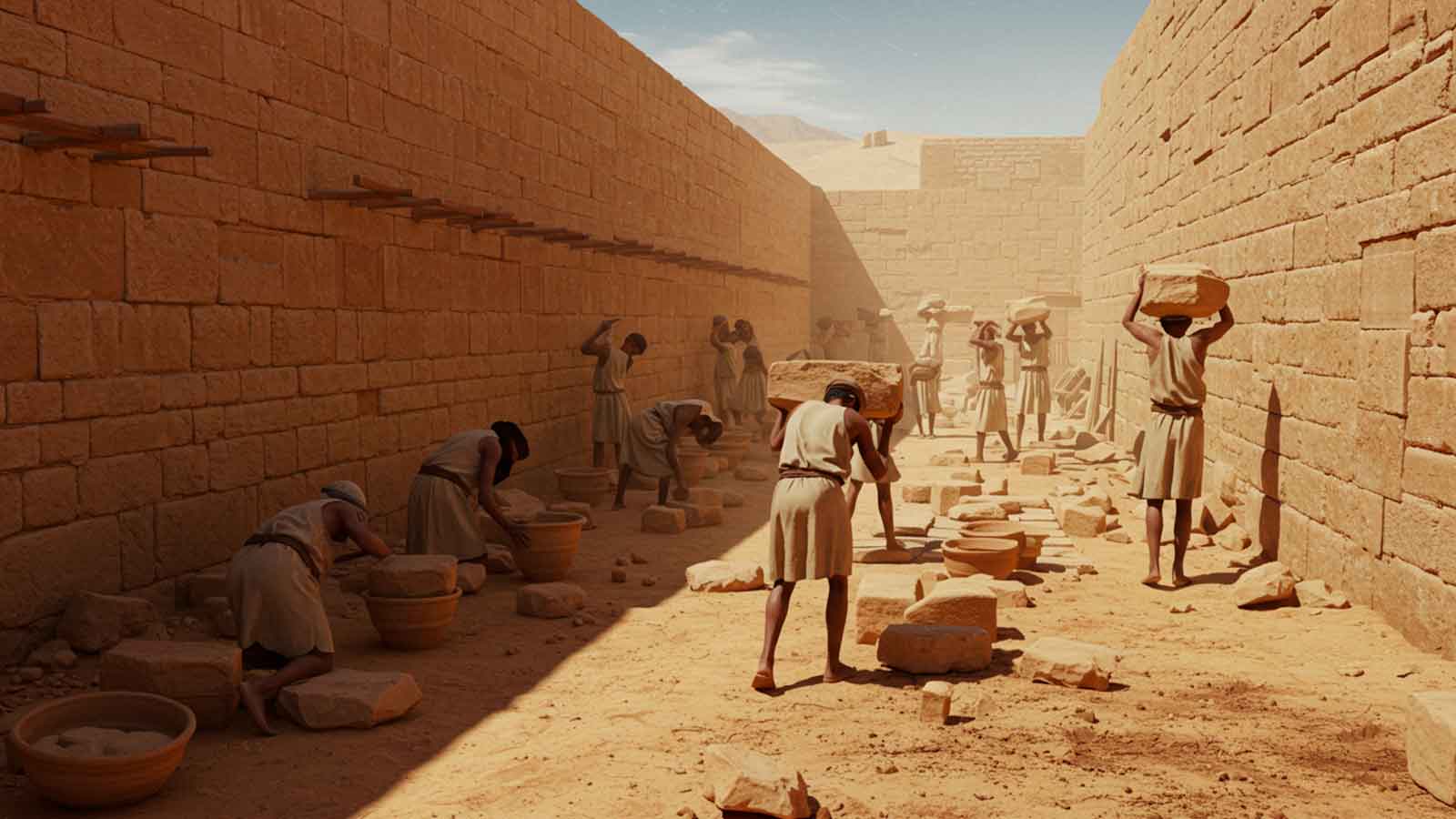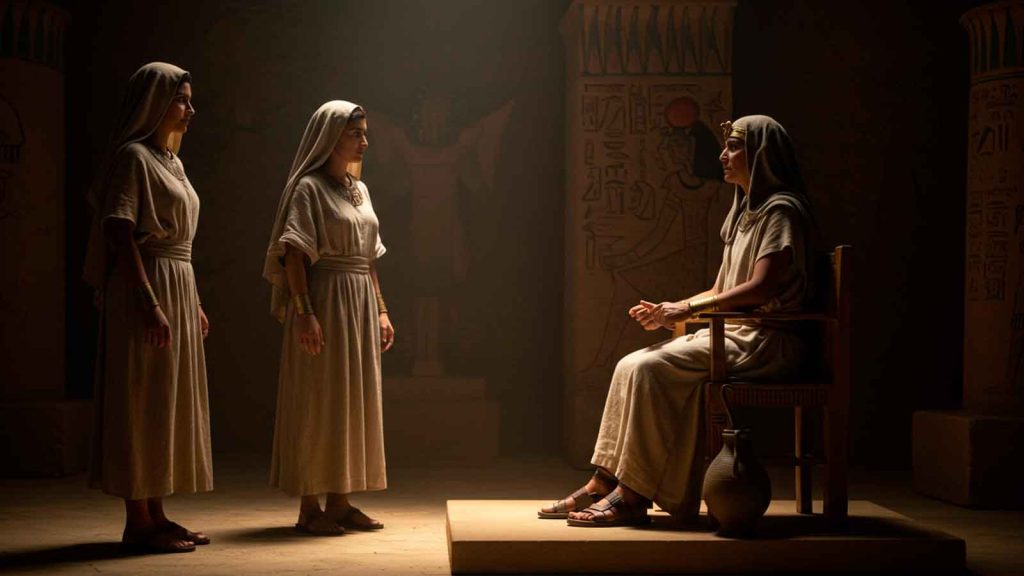Exodus 1 is the starting point for one of the most remarkable moments in the Bible: the deliverance of the Hebrews from slavery in Egypt.
In this opening chapter of the Book of Exodus, we see how oppression begins, how the people of Israel grow amid hardship, and how God is already moving behind the scenes toward a great deliverance.
Based on the biblical text, this article explores the main themes of exodus 1, its central characters, spiritual implications, and the lasting impact of this narrative.
Exodus 1 – Complete
¹ These are the names of the sons of Israel who entered Egypt with Jacob, each with his household:
² Reuben, Simeon, Levi, and Judah;
³ Issachar, Zebulun, and Benjamin;
⁴ Dan and Naphtali, Gad and Asher.
⁵ All the persons who were descendants of Jacob were seventy in all; but Joseph was already in Egypt.
⁶ Joseph died, as did all his brothers and all that generation.
⁷ The Israelites were fruitful, increased greatly, multiplied, and became exceedingly strong, so that the land was filled with them.
⁸ Then a new king, who did not know Joseph, arose over Egypt;
⁹ He said to his people, “Look, the people of the children of Israel are more numerous and mightier than we are.
¹⁰ Come, let us deal shrewdly with them. Otherwise, in the event of war, they may join our enemies, fight against us, and leave the country.”
¹¹ So they set taskmasters over them to oppress them with heavy burdens. They built for Pharaoh the store cities of Pithom and Raamses.
¹² But the more they were oppressed, the more they multiplied and spread, and the Egyptians came to dread the Israelites.
¹³ The Egyptians worked the Israelites ruthlessly;
¹⁴ They made their lives bitter with harsh labor in mortar and brick and in all kinds of fieldwork— all their labor was harsh and cruel.
¹⁵ Moreover, the king of Egypt spoke to the Hebrew midwives, one of whom was named Shiphrah and the other Puah,
¹⁶ He said, “When you help the Hebrew women during childbirth and see them on the delivery stool, if it is a son, kill him; but if it is a daughter, she shall live.”
¹⁷ The midwives, however, feared God and did not do as the king of Egypt commanded; they let the boys live.
¹⁸ So the king of Egypt summoned the midwives and asked, “Why have you done this and allowed the boys to live?”
¹⁹ The midwives answered Pharaoh, “Hebrew women are not like Egyptian women; they are vigorous and give birth before the midwife arrives.”
²⁰ Therefore God was kind to the midwives, and the people increased and became even more numerous.
²¹ And because the midwives feared God, He gave them families of their own.
²² Then Pharaoh commanded all his people, saying, “Every son that is born you shall cast into the river, but every daughter you shall let live.”

What Chapter Exodus 1 Is
Exodus 1 opens by recalling the names of Jacob’s sons who went down to Egypt, linking the new book to the close of Genesis. The introduction is brief, and the spotlight quickly shifts to the Israelites’ growing numbers and the fear of the new king of Egypt.
The Connection Between Genesis and Exodus
The Book of Exodus continues Joseph’s story, but now the Hebrews are increasing in number and viewed as a threat. The new Pharaoh did not know Joseph and shows no gratitude for what Jacob’s son had done for Egypt.
The New Pharaoh and the Shift in Treatment
In exodus 1, a new Pharaoh arises who does not recognize Joseph’s legacy. Fear of the Israelites’ population growth leads him to impose slavery and tight control.
The Growth of the Hebrews in Egyptian Territory
The multiplication of Israel’s descendants is emphasized in exodus 1. Even under oppression, the people keep growing, an important detail in the larger story unfolding in Exodus.
God Prospers His People Even in Hard Times
Despite every attempt at control, the Hebrews continue to multiply. This sustained growth is a clear sign of God’s blessing amid harsh circumstances.
Pharaoh’s Fear
Pharaoh’s reaction shows how the Israelites’ expansion caused social and political unease. He feared that in wartime they would ally themselves with Egypt’s enemies.

Slavery as an Attempt at Control
Exodus 1 reveals that the king of Egypt imposed forced labor on the Hebrews. The store cities of Pithom and Raamses were built with Israelite labor under extreme pressure.
Institutionalized Slavery and Oppression
The transformation of the Hebrews into slaves marks a new phase in their history. God’s people are now systematically oppressed, yet they keep growing.
Silent Resistance
Even without open rebellion, exodus 1 shows Israel’s spiritual resistance. Obedience to God and preservation of life are expressed indirectly but powerfully.
The Hebrew Midwives and Courage in the Face of Injustice
One of the most striking moments in exodus 1 is the stance of two women: Shiphrah and Puah. They disobey Pharaoh’s order to kill newborn Hebrew boys.
Who Were Shiphrah and Puah?
These midwives are named—rare and significant. They embody courage and faith, fearing God more than the king.
What We Learn From the Midwives
Exodus 1 teaches that even in a hostile context, we can make the right choices. Reverence for the Lord preserves life, and God rewards such actions.
The Escalation of Oppression: The Deadly Decree
Because of the midwives’ resistance, Pharaoh in exodus 1 intensified persecution. He decreed that every Hebrew boy must be thrown into the Nile.
An Attempted Genocide
This decree had the clear aim of gradually exterminating the Hebrew people, preventing their growth, and maintaining Egyptian dominance.
Preparing for Moses’ Arrival
The end of exodus 1 sets the stage for Moses’ birth. Even amid the death order, God preserves the one who will deliver Israel.

Exodus 1 and God’s Sovereign Plan
Despite oppression, exodus 1 shows that God is at work. His plan is never thwarted, and each detail contributes to future deliverance.
Growth Even Under Pressure
The Hebrews’ multiplication, even under forced labor, shows that God blesses His people in any circumstance. This spiritual truth remains relevant today.
Faithfulness Rewarded
God honors the midwives’ faithfulness and ensures the people’s continuity. He raises leaders and fulfills His promise to Abraham to form a great nation.
Practical Lessons From Exodus 1
Exodus 1 is not just a historical account; it delivers powerful lessons for today. Below are some key reflections from this chapter.
Courage Amid Unjust Systems
The midwives show us that integrity can prevail even in risky situations. Fearing God above all else is the surest path.
God Acts Even in Silence
Though there seem to be no overt miracles in exodus 1, the people’s growth and the preservation of the children reveal that God is present.
Oppression Does Not Halt the Promise
Even with death decrees, the promise given to Abraham remains alive. God never forgets His word, and exodus 1 proves this clearly.
Main Characters in Exodus 1
Pharaoh: symbol of oppressive power and political fear. His life shows how pride and fear can lead to cruelty.
Shiphrah and Puah: symbols of faith and resistance. With wisdom and reverence for God, they defied the system to do good.
The Hebrew people: though unnamed individually, represent the faithful community that grows and survives under oppression.
Comparing Exodus 1 With Other Bible Chapters
Genesis 15: God foretold that Abraham’s descendants would be oppressed but later set free with wealth. Exodus 1 marks the beginning of that prophecy’s fulfillment.
Exodus 2: Moses’ birth follows immediately, a direct response to the people’s cry and Pharaoh’s death decree.
Psalm 105: celebrates the promises made to the patriarchs, emphasizing that suffering in Egypt was part of God’s larger plan.
FAQ About Exodus 1
What does chapter Exodus 1 mean?
It introduces the narrative of the Hebrews’ deliverance, showing the onset of Egyptian oppression and Israel’s miraculous growth.
Who were the Hebrew midwives?
Shiphrah and Puah were God‑fearing women who refused to obey Pharaoh’s decree, saved lives, and were rewarded.
How did God respond to the oppression in Exodus 1?
God blessed the people with growth and preserved innocent lives, paving the way for their future liberation.
Why did Pharaoh want to kill the Hebrew boys?
He feared the Hebrews would become too strong, rebel against Egypt, and threaten national security.
Why is Exodus 1 important for Christians?
The chapter shows that faithfulness to God bears fruit even in difficult times and that His promise never fails.
Conclusion
Exodus 1 marks the beginning of a journey of faith, resistance, and redemption. Every verse reinforces that God is in control even when everything seems lost.
The people’s multiplication, the midwives’ courage, and the continuity of the divine promise show that no earthly power can stop the Lord’s plan. Studying exodus 1 teaches that the story of salvation often begins in pain but ends in deliverance.
READ ALSO:
- Verses of Healing and Miracles: Strengthen Your Faith
- Blessed Good Night by God: Spread Faith Before Sleeping
- Proverbs 31:3: A Wisdom Alert to Preserve Your Purpose
- Proverb 4 Complete With Explanation
FOLLOW US ON FACEBOOK
I hope this has helped.